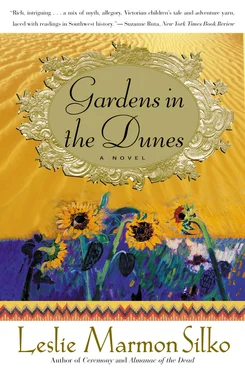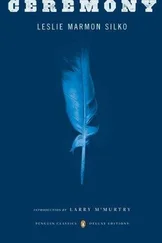Here it was even in the Bible — everything Wovoka said was true. With winds from the four directions scouring the earth, their slain ancestors would rise up into armies. The twins shared the last of the beer and argued over whose turn it was to go for another pail. Sister Salt felt the headache beer always gave her; she gathered up the sleeping baby to go to her tent. What the dog woman said must be true — the Blessed Mother of the Indians said to defend themselves, and don’t fear death.
Toward morning she heard Big Candy come into her tent and smelled the warm food he brought her, but he did not come kneel beside her to kiss her forehead until she woke, as he used to before the baby. This morning he set down the food and left. She listened to his footsteps recede and thought about going after him; but if he didn’t want to be with them, then she didn’t want to ask.
Sometimes those tiny babies lived for days, even weeks before they gave up the ghost; Big Candy’s mother used to say that was the cruelest thing those little babies did — stay alive long enough to give you false hope, and then break your heart. Poor mothers! Sometimes they held on to those babies for days after they died — one young mother even forced her nipple into the cold little mouth. The prospect of all that sadness and loss for a young girl who had already lost all her family made him feel exhausted and discouraged. It didn’t help that Wylie had a telegram from Washington that gave the military jurisdiction over access to the construction site in thirty days.
Big Candy tossed and turned without sleep; he knew he should be with Sister to comfort her, but she resented what he knew as inevitable. Better to let her have this time with her baby undisturbed. He lay thinking about the future and what they would do. Once the campsite was opened up to competitors, Wylie and he knew they’d see a big drop in their receipts; luckily they’d made hay while the sun shined, and he and Wylie were set. From here they each had enough to go anywhere and retire. He drifted in and out of sleep, aware of the shouts and occasional gunshots and laughter. He dreamed an elegant dining room in a fine hotel — out the windows all around were high mountains covered with snow. Wylie sat at the head of the table with men in military uniforms. They drank red wine from crystal goblets but no food had been served. In the kitchen Candy found a tiny black child wearing only a diaper by the stove, where it played with a black dog. The child was no larger than a baby but it could walk, and it smiled at him with a full set of teeth as it climbed on and over the dog’s back with strange agility. When he lifted the lids on the pots and on the roasting pans in the oven, all the food was gone, and only scraps, skin and bones, remained in the grease.
Even after he woke and struck a match to see the face of his pocket watch, Candy still felt agitated by the dream. He had to get more sleep or he’d feel weak and sick all day. He reached for the bottle of good bourbon he kept for medicinal purposes and took three big mouthfuls. The warmth of the spirits radiated out from his stomach over his entire body and one by one he felt his muscles relax until he felt himself drift weightlessly. He dreamed a small coffin partially uncovered, pushing up through the earth in a big military cemetery of identical white crosses. What was a baby’s coffin doing there? As he got closer he saw that the small coffin oddly resembled a floor safe. He woke with a start, his heart pounding. Had he reburied the floor safe deeply enough? Had he brushed over the disturbed sand and disguised the area under the tree well enough? He had been in a hurry and it was difficult to see by lantern in the dark. He’d have to check it later. The dream must refer to the baby’s death, though it had already survived longer than he thought it would. Sister’s baby was too small to live — even the Mojave women who tended the beer agreed about that.
Wylie complained he hadn’t slept well either. It was no wonder, with the soldiers bivouacked above the workers’ camp and more wagons arriving from Yuma and Prescott, even from Phoenix, in anticipation of the shift in authority over the construction site. Candy put the coffee on to boil first, then stirred the eggs into the batter and cut the bacon while Wylie sat in his long underwear at the table. Cigarette butts and spent matches filled a saucer next to an empty brandy bottle.
They’d made their stakes in the nick of time; these next few weeks they could coast along and still make plenty of money until all the others set up gambling tents and started to sell beer and barbecue. This was a good time to retire from federal projects anyway; Wylie’s political connections in Washington had been weakened by the scandal that followed the Panic of 1893.
Next year at this time they’d be retired and settled into their new lives — Wylie avoided mention of California or Denver because he still hoped to persuade Big Candy to settle on the West Coast with him. Wylie smiled to himself. He knew how to win over his friend — it was with the abundance of fresh seafoods not available before for Big Candy to prepare and serve. Wylie knew the fresh abalone steaks and butter clams were the way to Candy’s heart.
♦ ♦ ♦
At dawn Delena lit a fire to boil the water for coffee, then settled back to watch the pups. They woke up one after the other, and they yawned in unison. When they crowded around her, they leaped up at the same instant. They easily learned to run one after the other over barriers and kept their balance on narrow planks. When excited, they easily stood on their hind legs, so it didn’t take long to teach them to dance. She watched them tug and pull one another with a piece of old rope one of the dogs found; three pups tugged on each end and they whirled and spun around one another effortlessly.
The crippled mother dog stayed by her side, out of their way, because from time to time the pups fought over the rope. Their snarls and growls sounded terrifying; clouds of dust flew all around the knot of biting dogs as they tumbled over and over.
The first few times they fought one another like that, she feared a dog or two might be injured or killed. But when they finally stopped, the two dogs on the bottom of the heap emerged with nothing worse than bloody torn ears and dog saliva and dirt caked on their fur.
Later, with a tin cup of black coffee in one hand, she brought out the deck of Mexican cards. On the scraps of satin remnants she laid out the cards in the formation of the cross and the lance, then studied the figures and the dichos , or sayings, that belonged to each card.
The first card, La Rosa, the Rose, turned up to represent her! What good card this was! The Rose was the influence affecting her and its saying was “ Rosa, Rosita, Rosaura ”—“Rose, Little Rose, Rosiness”! The rose was a sign of the Señora of Guadalupe as well; roses were her blessing and sign to the poor Indians at Tepeyac.
The second card, which crossed the Rose, was the Barrel, but on its side, as if empty or dumped. The saying of the barrel was “ Tanto bebió el albañal que quedó como barril,” or “The bricklayer drank so much he became the shape of a wine barrel.” As a card that crossed her card, the Barrel wasn’t much opposition at all! Any obstacles she might encounter would be overturned as easily as an empty barrel.
The crowning card was the Rooster card, reversed — a good card to reverse because it had an ominous dicho—“El que le cantó a San Pedro no le volverá a cantar” (“The one who sang for St. Peter will not return to sing”). Probably because he got made into soup. The fourth card stood for her foundation, her origin; El Pino, the great Pine, stands proudly. “Always cool, fragrant, and always beautiful,” was the saying that went along with this card. A solid foundation in the pine forests of the highest mountains was where the people fled from the army before Delena was born.
Читать дальше












